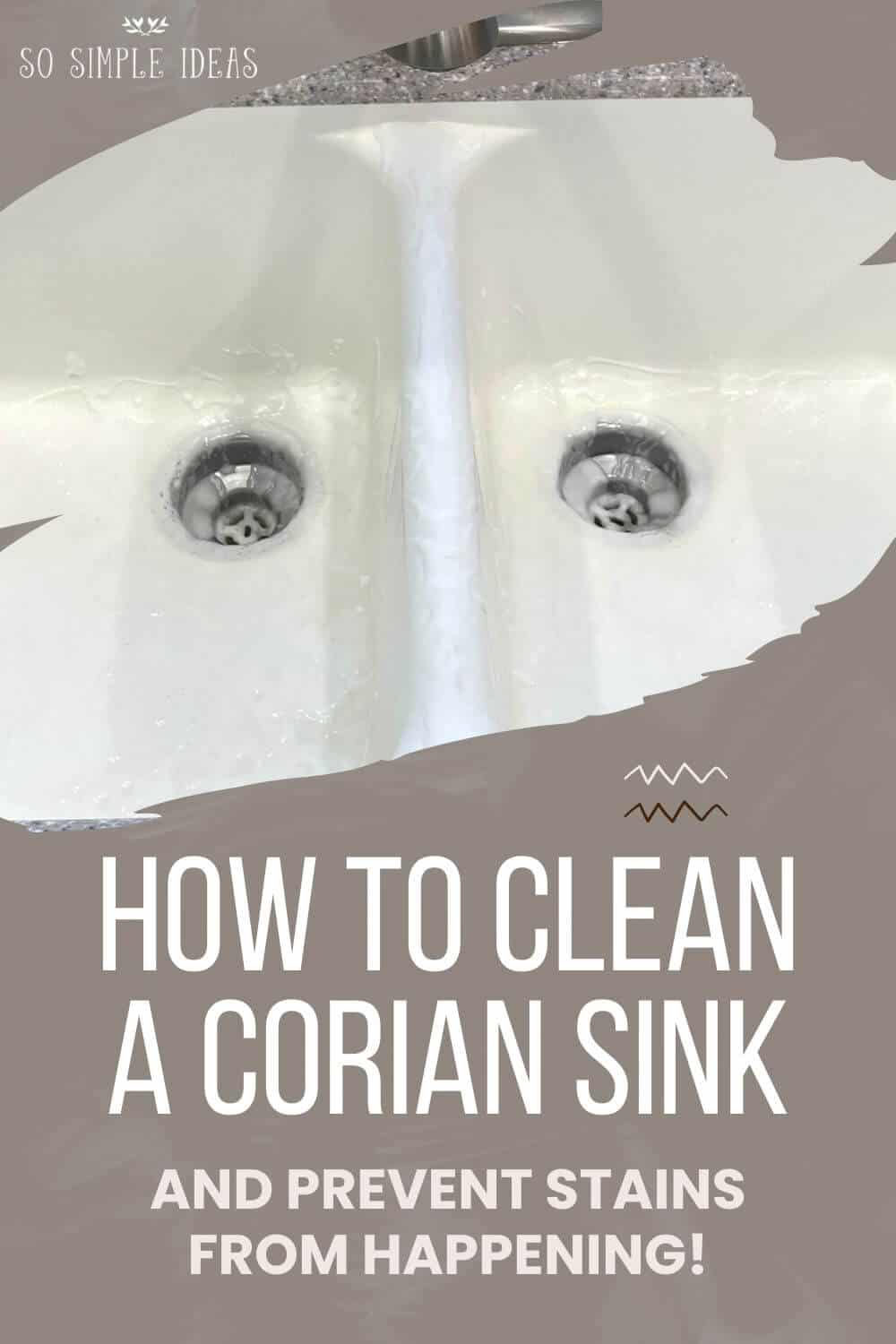In this article, you’ll learn how to clean Corian sinks as well as common causes and types of stains. For most stains, all you need are some simple ingredients that you probably already have in the house.
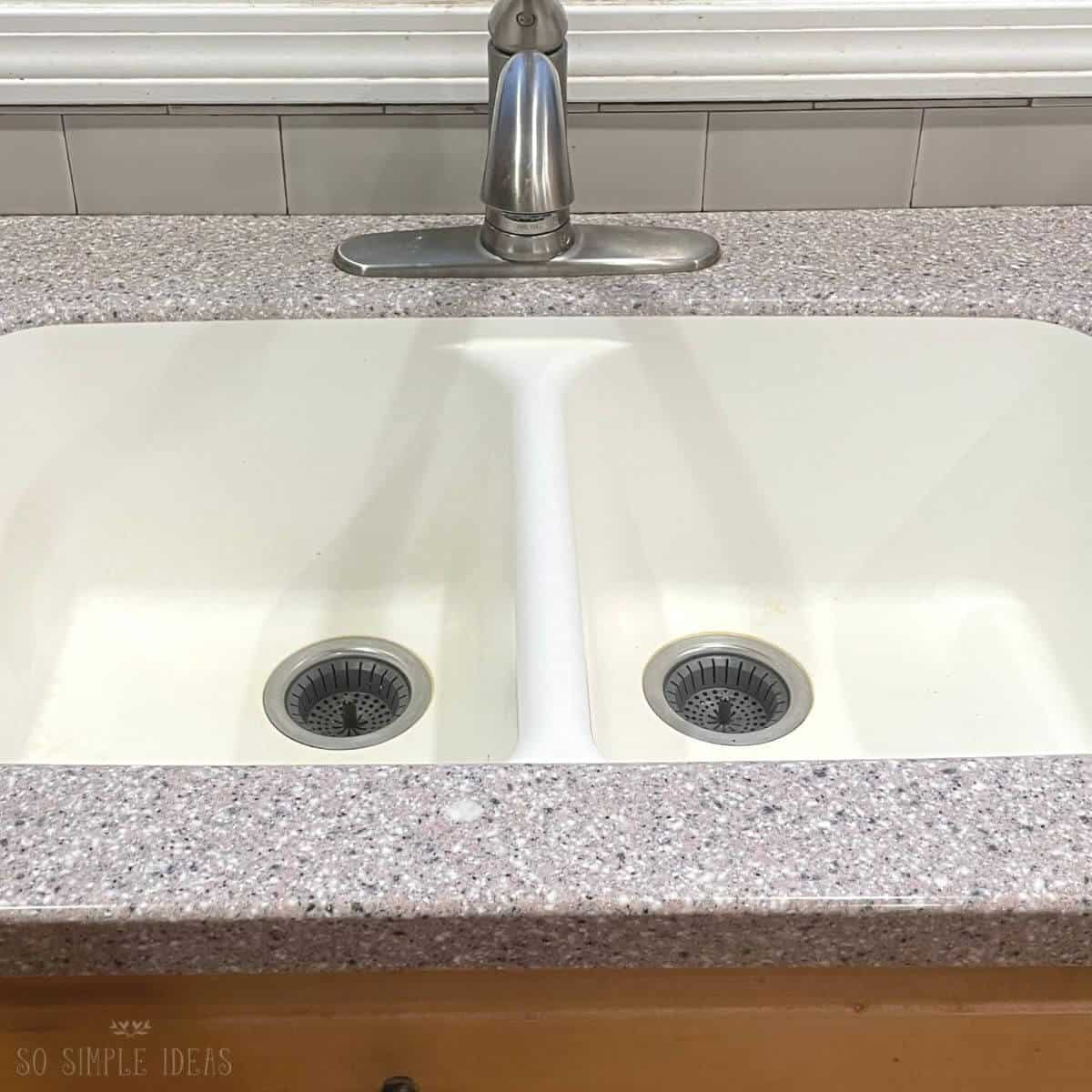
When it comes to kitchen sinks, Corian has one of the most exquisite looks in the industry. But, stains are inevitable on your beautiful white Corian kitchen sink.
After a while, the sink can look like nothing will get it sparkling again. This left me wondering, “How do you clean a badly stained sink?”
I know that so many of us have tried different products to get these tough stains out. I have used a lot of cleaners, and they never seem to work. But this time, I finally learned how to clean Corian sink stains. It can be done easily and with very little expense, as long as you have the right tools and methods.
Table of Contents
Causes of Stains
Sinks are often a focal point in a kitchen and can be a major source of frustration when they become stained. While there are many potential causes of stains on a solid surface sink, from food and grease to hard water and rust, there are also many methods when learning how to clean Corian sinks.
In most cases, it is best to take proactive measures to prevent stains from occurring in the first place. You can avoid wondering how do you clean a badly stained sink if you know the causes of stains and work to prevent them.
- Common spills: Corian can be stained when food or drink spills are left on the surface, including liquids like vinegar, dips, sauces, coffee, tea, and others. When a liquid spills on your sink, be sure to wipe it up right away.
- Hard water: Over time, the surface of your Corian sink may start to look dull or blotchy. This is often caused by letting hard water dry on the surface, leaving behind a thin layer of mineral deposits.
- Chemicals: Spills of strong chemicals such as paint strippers, various cleaners, and acetone-based removers can also damage Corian. When working with strong chemicals, accidental spills should be flushed promptly with plenty of soapy water.
- Grease, fat and oil: These oily substances are not water soluble and can be tricky to get rid of completely. They can be caused by oily foods like butter and cooking oil. To get rid of them, scrub the surface with a small amount of diluted bleach.
Cleaning your sink regularly with the appropriate products and practices can help keep your sink looking its best. If a stain does occur, however, there are several methods you can try to get it sparkling again.
Types of Stains
Corian is popular because it is durable and easy to clean. However, even a sink made of this material can show signs of wear including stains and discoloration over time.
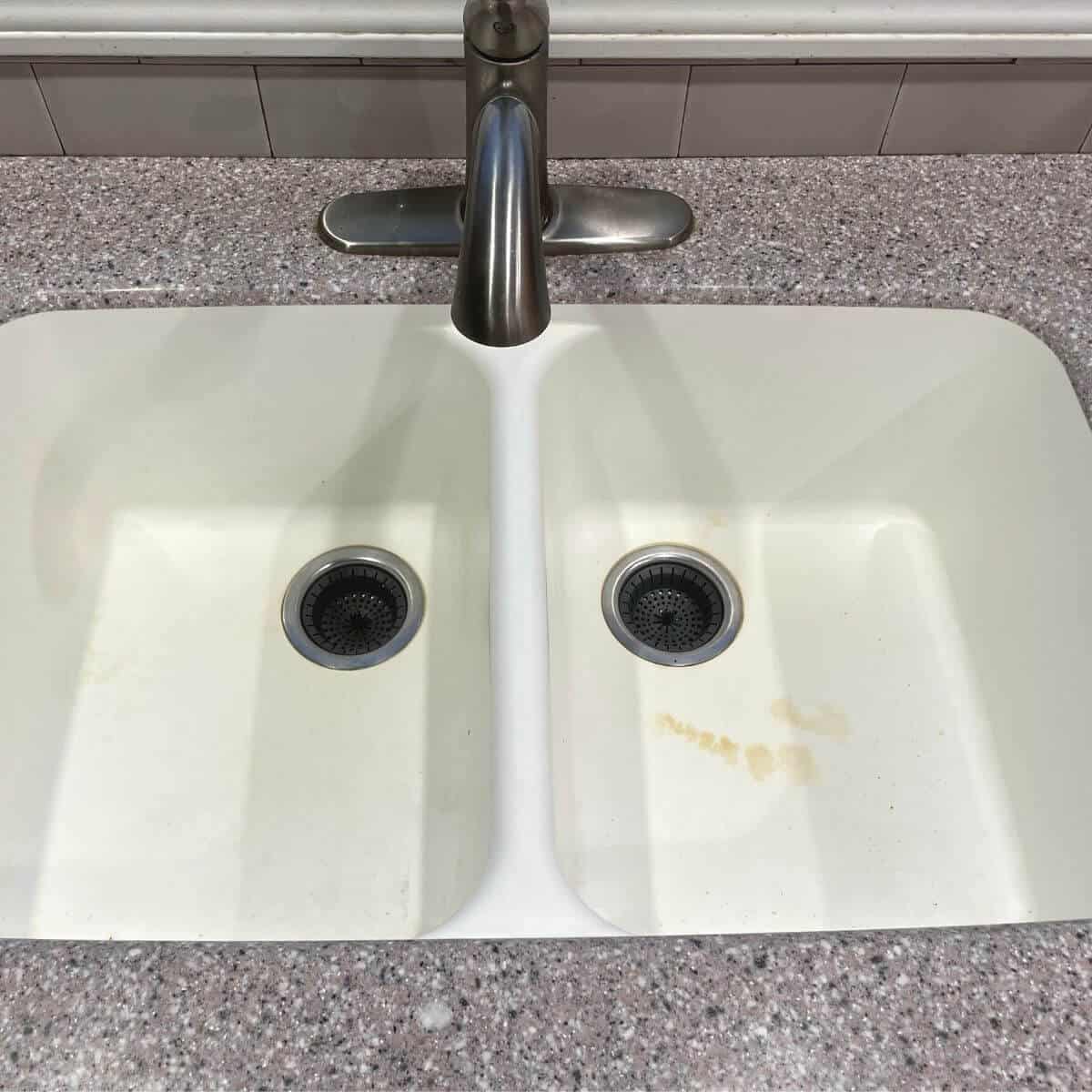
There are different types of stains that can appear on a Corian sink, and each one requires a different treatment method. Here are the most common types of sink stains:
- Corian Stains: If water leaks onto the surface of your sink, pink, brown, or yellow stains may develop. These are known as Corian stains, and they occur when minerals in water react with Corian. This can happen if you have an older sink that was installed improperly or if it is located in a humid bathroom.
- Hard Water Stains: Hard water contains a greater than average amount of minerals. It leaves behind blotches, smudges, and other unsightly stains on your sink, making it look dull and dingy. When hard water evaporates, a white residue lingers behind.
- Food Stains: To prevent stains from forming in your kitchen sink, you should immediately remove food scraps and grease that accumulate after washing the dishes.
- Heat marks: Never put a hot pan directly on your Corian because the heat can damage it. Use a heat protection pad, trivet, or sink mat as needed and always let your cookware cool before putting it in your sink.
- Scratches: It’s normal for Corian sinks to develop slight abrasion marks in normal daily use. Dark colors show scratches, dust, and ordinary wear and tear more readily than lighter colors do.
How to remove stains
Corian is durable and easy to clean, making it a great choice for homeowners who want to upgrade their kitchens. Unfortunately, sinks made with the material can become stained over time due to everyday use and exposure to food and cleaning products.
While a stained sink is not as aesthetically pleasing, it does not mean that you need to replace the entire unit. So, how do you clean a badly stained sink? You can clean your Corian sink with these simple tips and tricks.
Soft sponge rub
Try using a soft cloth or sponge that has been dipped in warm water and dish detergent. Gently rub the stain until it is gone.
Baking soda paste
Create a paste made of baking soda and water. Apply the paste to the stain and leave it on for 15 minutes before you scrub the stain away with a brush or sponge.
Baking soda and hydrogen peroxide paste
For stubborn stains, try a mixture of baking soda and hydrogen peroxide in a paste. Let the paste sit on the stains for a whole day or overnight before rinsing off.
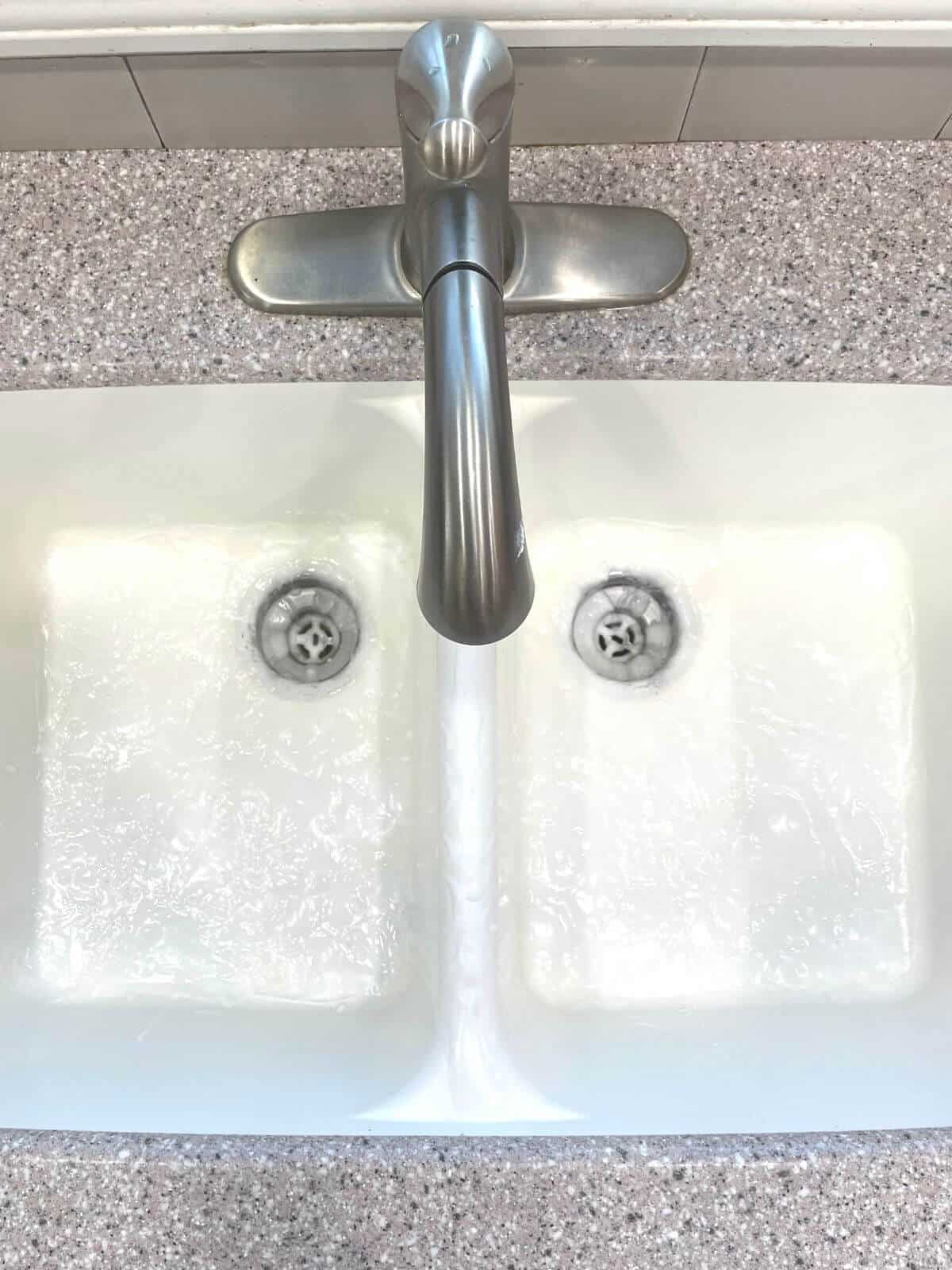
Vinegar
You can also use vinegar as a cleaning agent for Corian because it can remove stains from the surface. Vinegar removes limescale, mineral deposit, and hard water. Make sure to test out this method on an inconspicuous part of your countertop before applying it to the entire thing!
Diluted bleach mixture
To remove grease, fat, and oil stains from your sink, fill a spray bottle with 3/4 bleach and 1/4 water and apply the mixture to the stain. Protect the faucet and fixtures by wrapping them with tape. Spray the entire sink surface with the solution and let it sit overnight, then rinse it with warm water.
Commercial product
If none of the above methods work, you can try using a commercial product specifically designed to remove Corian stains. Be sure to read the directions carefully before use.
One product that has worked for me on tough stains is Soft Scrub with bleach. I rub the product on with a sponge to clean the entire sink. Then, I’ll squeeze a little more on any stains and let the product sit overnight before rinsing off.
What not to do
Cleaning Corian requires care to avoid damaging the surface. Never use abrasive materials like steel wool or scouring powder, and steer clear of strong chemicals like undiluted chlorine bleach.
Here are other things to avoid if you know how to clean Corian sinks properly.
- Don’t use ammonia. It can damage both the finish and the color of your sink, and it can be harmful if you breathe in the fumes. Instead of using ammonia, try a mild soap and water solution or baking soda and water.
- Don’t use solvents such as acetone or paint thinner. These substances can cause damage to and even dissolve your sink’s surface.
- Don’t place hot objects directly onto the kitchen sink. Always place pans and other hot implements on a heat protection pad or raised rack, and allow them to cool completely before placing them in the sink.
- Don’t let water sit on your sink for long periods of time. This can cause stains from minerals in tap water to form on the surface of your sink.
- Don’t pour boiling water into the sink. Run cold water in the sink when draining pasta or other hot substances.
FAQs
If you don’t see your question answered below, don’t be afraid to let us know in the comments!
The best way to clean a Corian sink is with a soft sponge or cloth and one of the following cleaning solutions: dish soap and water, baking soda and water, baking soda and hydrogen peroxide, vinegar, diluted bleach, or mild commercial cleaner.
Once or twice a week, give your sink a quick cleaning. Remove all the fat and oil residues of normal food preparation from the sink with soap and warm water, or with a hard-surface cleaner.
If you want to remove a stain, try scrubbing it with dish soap and water first. If that doesn’t get the stain out, mix together some baking soda and water. Using an old toothbrush or sponge, scrub the area until it is clean.
If stubborn stains are a problem, a paste made of baking soda and hydrogen peroxide can help if left on overnight. For hard water stains, vinegar can do the trick. If nothing else works, try letting Soft Scrub with bleach sit overnight before rinsing off.
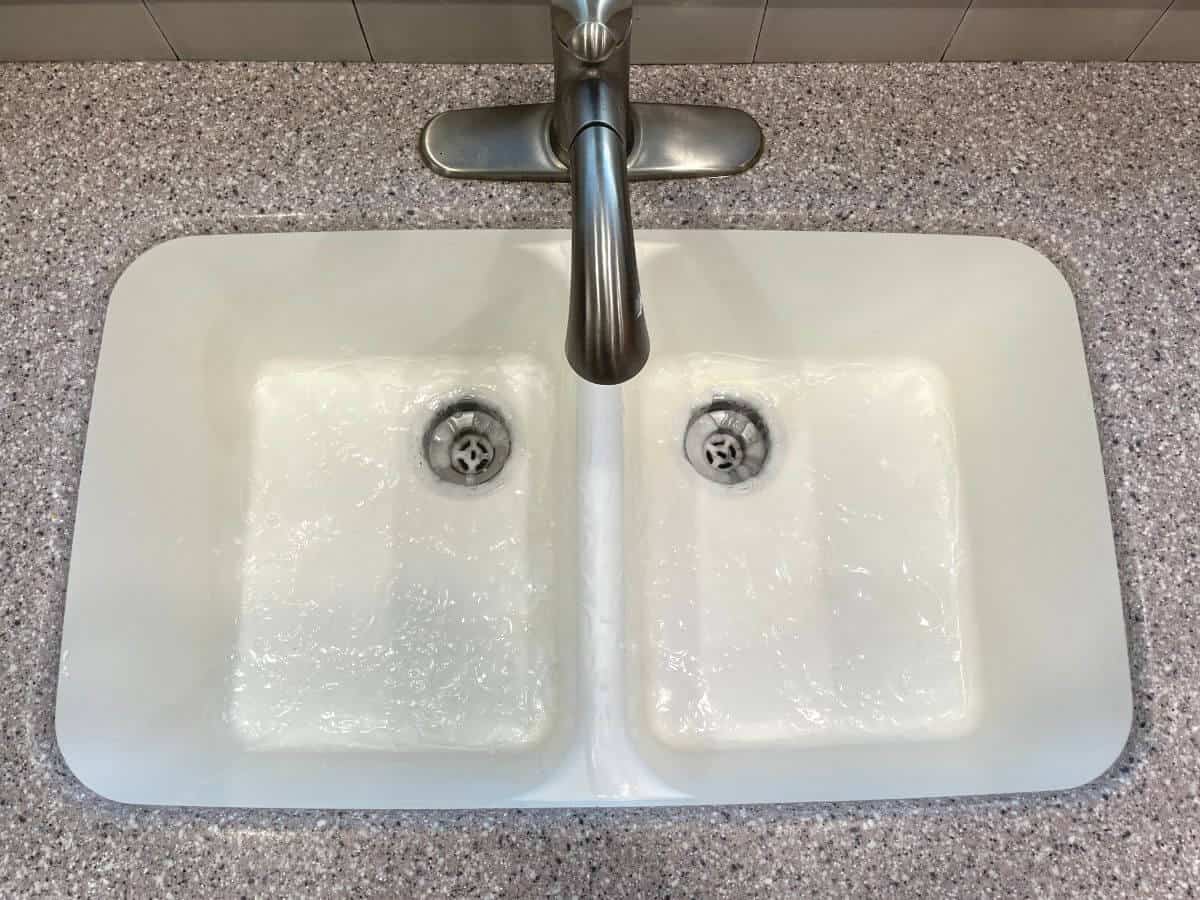
Other Articles You May Be Interested In
If you find this article helpful, here are some additional articles that may interest you:

